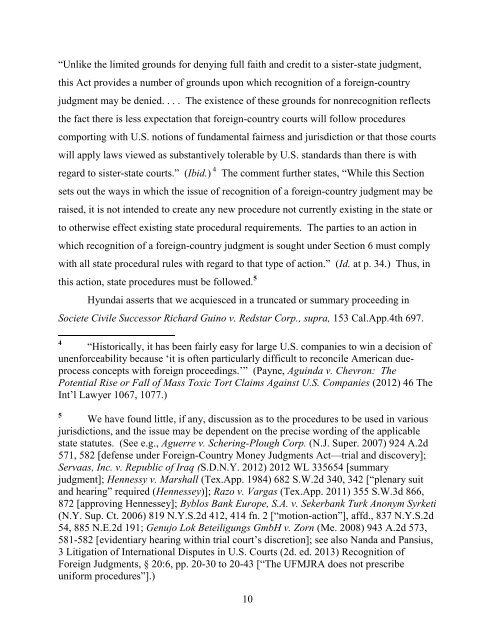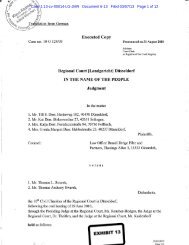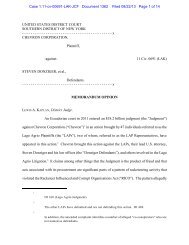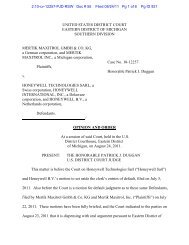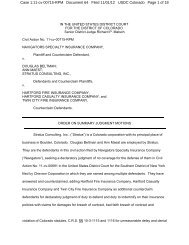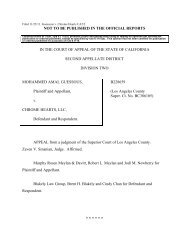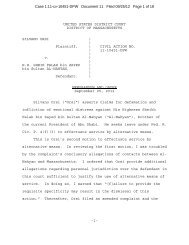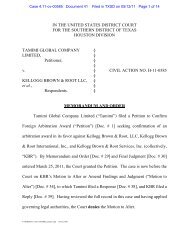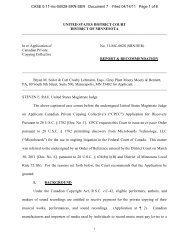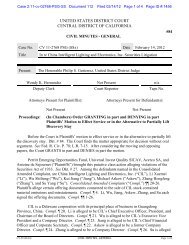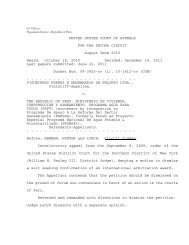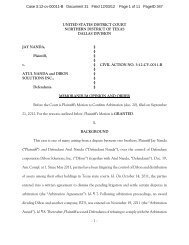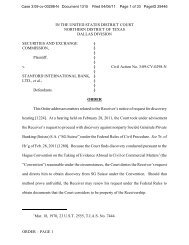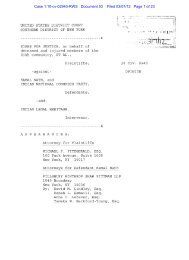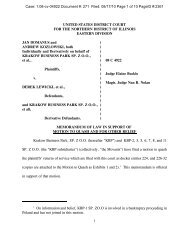Hyundai Securities Co. v. Lee (Cal. Ct. App. 2013) - Letters Blogatory
Hyundai Securities Co. v. Lee (Cal. Ct. App. 2013) - Letters Blogatory
Hyundai Securities Co. v. Lee (Cal. Ct. App. 2013) - Letters Blogatory
You also want an ePaper? Increase the reach of your titles
YUMPU automatically turns print PDFs into web optimized ePapers that Google loves.
“Unlike the limited grounds for denying full faith and credit to a sister-state judgment,<br />
this Act provides a number of grounds upon which recognition of a foreign-country<br />
judgment may be denied. . . . The existence of these grounds for nonrecognition reflects<br />
the fact there is less expectation that foreign-country courts will follow procedures<br />
comporting with U.S. notions of fundamental fairness and jurisdiction or that those courts<br />
will apply laws viewed as substantively tolerable by U.S. standards than there is with<br />
regard to sister-state courts.” (Ibid.) 4 The comment further states, “While this Section<br />
sets out the ways in which the issue of recognition of a foreign-country judgment may be<br />
raised, it is not intended to create any new procedure not currently existing in the state or<br />
to otherwise effect existing state procedural requirements. The parties to an action in<br />
which recognition of a foreign-country judgment is sought under Section 6 must comply<br />
with all state procedural rules with regard to that type of action.” (Id. at p. 34.) Thus, in<br />
this action, state procedures must be followed. 5<br />
<strong>Hyundai</strong> asserts that we acquiesced in a truncated or summary proceeding in<br />
Societe Civile Successor Richard Guino v. Redstar <strong>Co</strong>rp., supra, 153 <strong>Cal</strong>.<strong>App</strong>.4th 697.<br />
4 “Historically, it has been fairly easy for large U.S. companies to win a decision of<br />
unenforceability because „it is often particularly difficult to reconcile American dueprocess<br />
concepts with foreign proceedings.‟” (Payne, Aguinda v. Chevron: The<br />
Potential Rise or Fall of Mass Toxic Tort Claims Against U.S. <strong>Co</strong>mpanies (2012) 46 The<br />
Int‟l Lawyer 1067, 1077.)<br />
5 We have found little, if any, discussion as to the procedures to be used in various<br />
jurisdictions, and the issue may be dependent on the precise wording of the applicable<br />
state statutes. (See e.g., Aguerre v. Schering-Plough <strong>Co</strong>rp. (N.J. Super. 2007) 924 A.2d<br />
571, 582 [defense under Foreign-<strong>Co</strong>untry Money Judgments Act—trial and discovery];<br />
Servaas, Inc. v. Republic of Iraq (S.D.N.Y. 2012) 2012 WL 335654 [summary<br />
judgment]; Hennessy v. Marshall (Tex.<strong>App</strong>. 1984) 682 S.W.2d 340, 342 [“plenary suit<br />
and hearing” required (Hennessey)]; Razo v. Vargas (Tex.<strong>App</strong>. 2011) 355 S.W.3d 866,<br />
872 [approving Hennessey]; Byblos Bank Europe, S.A. v. Sekerbank Turk Anonym Syrketi<br />
(N.Y. Sup. <strong>Ct</strong>. 2006) 819 N.Y.S.2d 412, 414 fn. 2 [“motion-action”], affd., 837 N.Y.S.2d<br />
54, 885 N.E.2d 191; Genujo Lok Beteiligungs GmbH v. Zorn (Me. 2008) 943 A.2d 573,<br />
581-582 [evidentiary hearing within trial court‟s discretion]; see also Nanda and Pansius,<br />
3 Litigation of International Disputes in U.S. <strong>Co</strong>urts (2d. ed. <strong>2013</strong>) Recognition of<br />
Foreign Judgments, § 20:6, pp. 20-30 to 20-43 [“The UFMJRA does not prescribe<br />
uniform procedures”].)<br />
10


